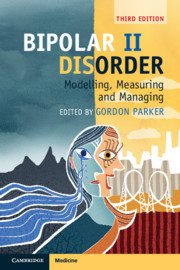Bipolar II Disorder (3rd Ed., New edition) Modelling, Measuring and Managing
Langue : Anglais
Coordonnateur : Parker Gordon

Now in its third edition, this book is the only academic and clinical management review focusing on bipolar II disorder.
The lifetime risk of developing bipolar II disorder is 5-7%, yet the condition is often poorly detected. Mood elevation states are less extreme than in bipolar I disorder although the depressive episodes are usually severe. When correctly treated, the outcome is positive, but bipolar II is often poorly managed, resulting in a high suicide rate. This is the only academic and clinical management review focused entirely on bipolar II, scrutinizing history, epidemiology, burden and neurobiology and including an extensive clinical debate by international experts about effective management strategies. Now in its third edition, this book features new chapters on the limitations to clinical treatment trials and perinatal management nuances. In a completely new section, international experts offer their personal responses and distinctive wisdom to key management issues and allow the reader to observe a variety of opinions.
Part I. Domain Chapters: 1. Mapping the terrain of bipolar II disorder Gordon Parker; 2. Bipolar disorder in historical perspective Edward Shorter; 3. The bipolar spectrum Chris B. Aiken; 4. Defining and measuring bipolar II disorder as a categorical condition Gordon Parker; 5. Bipolar II disorder in context: a review of its epidemiology, disability and economic burden Trisha Chakrabarty, George Hadjipavlou, David J. Bond and Lakshmi N. Yatham; 6. Comorbid conditions associated with bipolar II disorder Gordon Parker and Stacey McCraw; 7. Personality and temperament styles associated with bipolar II disorder Tahlia Ricciardi; 8. Differentiating bipolar II disorder from personality-based dysregulation disorders Joel Paris and Adam Bayes; 9. The neurobiology of bipolar II disorder Emre Bora and Christos Pantelis; 10. Methodological nuances in undertaking and interpreting efficacy studies of medications for bipolar II disorder Gabriela Tavella and Gordon Parker; 11. The role of antidepressants in managing bipolar II disorder Joseph F. Goldberg; 12. Mood stabilizers in the treatment of bipolar II disorder David J. Bond, George Hadjipavlou and Lakshmi N. Yatham; 13. The use of antipsychotic drugs in bipolar II disorder Eduard Vieta; 14. Perinatal nuances in managing bipolar II disorder Gabriela Tavella and Philip Boyce; 15. Psychological interventions for managing bipolar II disorder Vijaya Manicavasagar and David Gilfillan; 16. The role of wellbeing plans in managing bipolar II disorder Margo Orum; 17. The trajectory of illness experienced by those with a bipolar II disorder Tessa Cleradin; Part II. Management Commentaries: 18. Introduction to management commentaries Gordon Parker; 19. Management commentary Jay Amsterdam and Lorenzo Lorenzo-Luaces; 20. Management commentary Darryl Bassett; 21. Management commentary David Castle; 22. Management commentary Kostantinos N. Fountoulakis; 23. Management commentary Sophia Frangou; 24. Management commentary Heinz Grunze; 25. Management commentary Tadafumi Kato; 26. Management commentary Gin Malhi; 27. Management commentary Philip B. Mitchell; 28. Management commentary Lawrence T. Park and Carlos A. Zarate, Jr; 29. Management commentary Robert Post; 30. Management commentary Joshua Rosenblat and Roger McIntyre; 31. Management commentary Ayal Schaffer; 32. Management commentary Michael E. Thase; 33. Management commentary Mauricio Tohen; 34. Management commentary Eduard Vieta; 35. Management commentary Lakshmi Yatham; 36. Management commentary Allan Young; Part III. Conclusion: 37. Rounding up Gordon Parker.
Gordon Parker is currently Scientia Professor of Psychiatry, University of New South Wales, Sydney, and was Executive Director of the Black Dog Institute from 2002 to 2011. He was, for nearly two decades, Head of the School of Psychiatry at the University of New South Wales and Director of the Division of Psychiatry at the Prince of Wales and Prince Henry Hospitals, and was part-time Research Director of the Institute of Mental Health in Singapore.
Date de parution : 01-2019
Ouvrage de 318 p.
15.6x23.4 cm
Thème de Bipolar II Disorder :
© 2024 LAVOISIER S.A.S.



